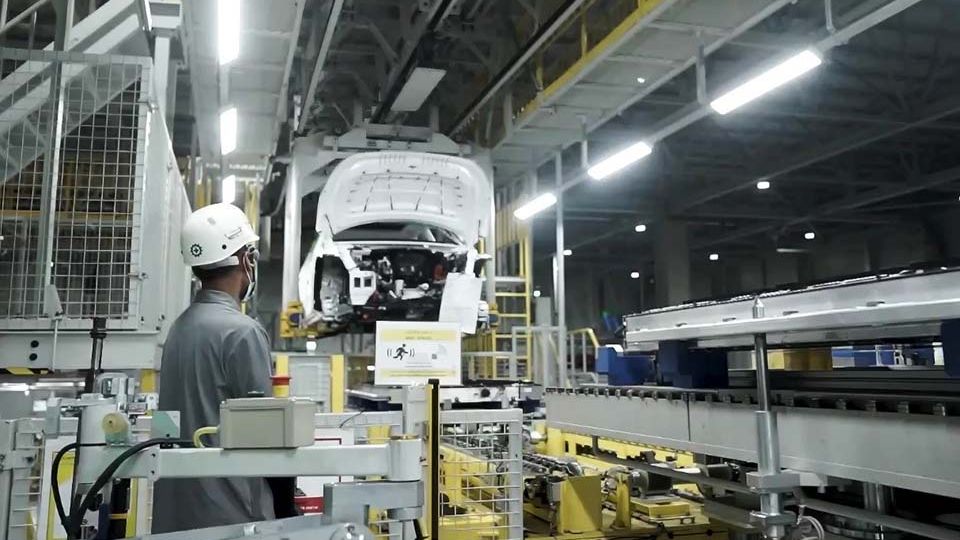August 5, 2024
JAKARTA – Indonesian manufacturers have turned pessimistic about growth prospects on the back of weakening demand, supply chain snarls and rising costs, prompting finger-pointing among politicians and calls for action from business representatives.
The country’s manufacturing purchasing managers’ index (PMI) slipped into contraction territory in July for the first time in more than two years.
The headline index, a key gauge of manufacturing activity, fell to 49.3 points from 50.7 in June, according to the PMI report published by S&P Global released on Thursday.
This marks the first contraction since August 2021, at the height of the COVID-19 pandemic, and comes after 34 consecutive months of expansion.
A reading below 50 indicates a decline in activity while values above that threshold signify expansion.
“The market slowdown led to a marginal decline in operating conditions in July, with new orders dropping and production decreasing for the first time in two years,” Paul Smith, economics director at S&P Global Market Intelligence, said in a press release published on Thursday to accompany the latest survey results.
Manufacturers had become more cautious, cutting back on purchasing and employment at the fastest rate since September 2021, Smith added, while supply constraints had worsened the situation with extended delivery times due to ongoing shipping challenges.
Read also: Carmakers to revise targets as first half sales disappoint
Industry Minister Agus Gumiwang Kartasasmita said he was “not surprised” by the survey results and blamed the downturn on policies issued by the Trade Ministry to relax import restrictions.
“We see [the decline as being] logical, because all of this was predicted when the import relaxation policy was issued,” Agus said in a statement on Thursday.
He called for synergy in government policies to support the manufacturing sector and expressed hope that the PMI survey results would prompt ministers and other stakeholders to align their measures and views for strengthening domestic industries.
“The Industry Ministry cannot do this alone,” Agus said.
“The manufacturing sector is already in a difficult position due to global conditions, including logistics, which are very unfavorable for this sector,” he continued. “Therefore, ministers should not issue policies that further harm the industry.”
Speaking to The Jakarta Post on Friday, the Indonesian Employers Association’s (Apindo) Bobby Gafur Umar warned that the slumping manufacturing sector could drag down economic growth in the second half of the year.
“[The decline] cannot be taken lightly, and [the government] must take concrete measures,” he said.
The sector, which accounts for almost one fifth of the country’s gross domestic product (GDP), had been grappling with weakening demand and soaring production costs despite various government measures, added Bobby, who is in charge of the manufacturing industry at Apindo.
He called for “better coordination” among the trade, industry and finance ministries during the current trying times and advised focusing on “maintaining domestic consumption” until the next administration took over.
Industry Ministry spokesman Febri Hendri Antoni Arif previously pointed to other factors behind the index decline, including the government’s mass release of imported containers from customs through the Office of the Coordinating Economic Minister and the Finance Ministry in May “without technical consideration from the relevant technical ministries”, which further hindered the manufacturing sector’s performance.
Read also: Hopes rise for BI-Rate cut on lower inflation, Fed signals
Contraction an ‘early warning’
The country’s manufacturing sector slipping into the contraction zone could be a cause for concern, Bank Permata’s Josua Pardede told The Jakarta Post on Friday, but the listed bank’s chief economist added that the data was not necessarily a harbinger of a prolonged downturn.
The long-term trend for the sector remained positive, Josua said, as reflected in the Industry Ministry’s own Industrial Confidence Index (IKI) released on Wednesday.
“Though slowing, with the index dropping slightly to 52.4 from 52.5 in June, it remained in positive territory,” Josua said, suggesting that the PMI figure should nevertheless serve as an “early warning” for policymakers.
He urged the government to refine trade policies by focusing on increased involvement in global supply chains, diversifying export markets for homegrown products and investing in human resources.
Dendi Ramdani, industry and regional research head at state-owned lender Bank Mandiri, said on Friday that the long-term trend of the manufacturing performance “will improve” as an expected interest rate cut in September or the fourth quarter at the latest signaled optimism for growth.
The United States’ Federal Reserve (Fed) and Bank Indonesia (BI) are both scheduled to hold their next policy meetings on Sept. 17-18.
At the last board of governors meeting, BI Governor Perry Warjiyo said the central bank might start cutting rates in the fourth quarter, based on a projected Fed rate cut in November.
The US central bank left the federal funds rate untouched at its policy meeting on Wednesday but Fed Chairman Jerome Powell gave his strongest signal yet that the high-rate cycle might soon be over, according to analysts. A rate cut in the US would make it easier for BI to cut its own interest rate, which in turn would help Indonesian businesses get cheaper funding.
Dendi urged the government to maintain stability and avoid policies that could exacerbate challenges for business players as well as the public.
“The recent import policies appear threatening and misguided [for businesses], and unnecessary operations conducted by the [Finance Ministry’s] Directorate General of Customs and Excise are an example of inappropriate forms of intervention that negatively impact businesses.”
The Trade Ministry did not respond immediately to the Post’s request for comment.


